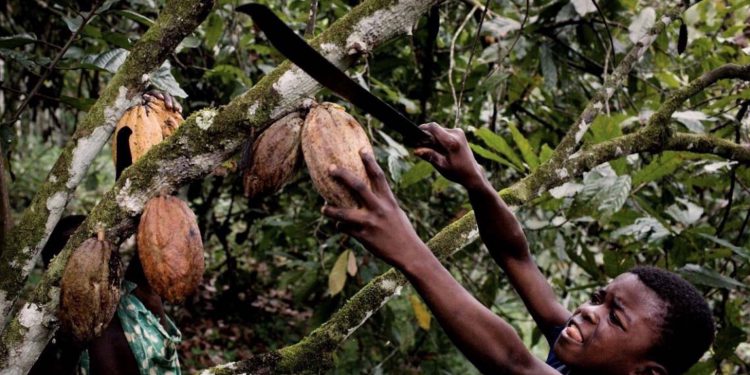The world’s largest cocoa companies have responded to a class action in the US alleging responsibility for the trafficking of Malian children to Ivory Coast for forced labour.
Human rights lawyer Terrence Collingsworth of IRAdvocates is behind the class action. He said the response demonstrates corporate self-monitoring is failing to protect children in this sector.
In video
- Why do you believe corporate self-monitoring has failed?
The suit was filed in February against Nestlé, Cargill, Barry Callebaut, Mars, Olam, Hershey, and Mondelēz on behalf of all children trafficked from Mali to Ivory Coast between 2009 and February 2020 to work as forced labour on the plantations providing their cocoa.
The response from the companies says, the “defendants strongly condemn the use of forced labour. Moreover, they are also working to address the distinct issue of non-forced child labour in the cocoa supply chains…
“The plaintiffs’ theory would mean that any person purchasing products or materials produced in a particular country — including consumers and retailers who may “benefit” from lower prices — could be held liable based on trafficking carried out by unknown producers anywhere in that country…
“They promised to stop using child slaves”
“At bottom, the plaintiffs seek to hold the defendants liable because, although the defendants have engaged in decades-long efforts to help combat and mitigate child labour in Ivory Coast, those efforts have not succeeded…”
Terrence Collingsworth said, “The companies’ legal position conflicts with their own claims to consumers and regulators. They claim to have close relationships with their farmers and that they have been working directly with them to eradicate child labour.
“The companies’ shocking position in federal court directly confirms that they will do just about anything to keep profiting from enslaved children.”
Speaking recently at Quota’s UN pre-Food Systems Summit event, he said, “The reason I’m particularly outraged about the cocoa sector is that in 2001 after we did research showing truly horrible conditions of trafficked children, enslaved children, harvesting cocoa for giant corporations, America’s Congress passed a law that prohibited the importation of cocoa harvested by child slaves.
“The industry quickly mobilised, hired expensive lobbyists, and in the Senate they managed to convert that to the Harkin Engel protocol which is a voluntary initiative and which all the big cocoa companies signed in 2001.
“They promised to stop using child slaves. In the intervening 20 years they have given themselves four extensions of time. And now they’ve set their own goal that by the year 2025 they will reduce child labour by 70 per cent.
“You cannot let the fox guard the chicken coop”
“That’s what happens when you let corporations self-monitor, they continue to profit from whatever they are doing whether it is harming the environment or human rights. You cannot let the fox guard the chicken coop.”
This event was dedicated to addressing all human rights in agrifood, across the environment, land sovereignty and health as well as labour, through improved labelling.
The response to Terrence Collingsworth’s class action, filed jointly by the seven companies, says they are “US-based companies that are among the furthest downstream in the global cocoa supply chain.
“Cargill, Incorporated, Cargill Cocoa, and Olam International Americas, Inc. are cocoa suppliers that purchase cocoa beans from intermediaries, process them, and sell the processed cocoa to companies that use cocoa in their consumer products.
“Nestlé USA, Inc., Barry Callebaut USA, Mars, Incorporated, The Hershey Company, and Mondelēz International, Inc. are cocoa processors and food and beverage manufacturers that use cocoa purchased from various suppliers.
“In purchasing cocoa, the defendants are subject to Ivorian law… there is a minimum price, set by the national government, that farmers must be paid…”
Terrence Collingsworth said, “This obviously ignores that the companies are free to pay a higher price, a liveable wage price, but they apparently collude in jointly paying the minimum price.”
Speakers at a Quota event in April on the subject of child slavery in cocoa said that the big seven have the ability to influence the government of Ivory Coast to pay higher prices.























